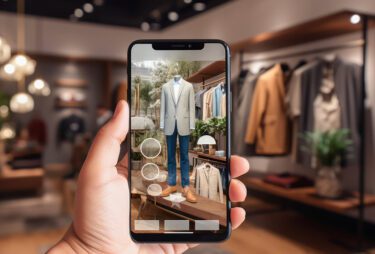The curiosity surrounding artificial intelligence (AI) is reaching a fever pitch, and there doesn’t seem to be any sign of slowing down. Not to ignore that AI is still an incredibly divisive tool, with many arguing that it will change things for the worse rather than the better. But a more nuanced take on AI’s effects on industries reveals that it’s never that cut and dry.
The retail industry is an excellent example; AI use is already changing it from the inside out. But what exactly is AI’s new role in retail, and how much will it impact inventory management, retail marketing, and overall business operations? Here’s how we see AI changing the retail landscape in the coming years.
“Personalized” Touches
 Ironically, a category where AI will make leaps and bounds for retail is by finding simpler, easy-to-implement ways to connect with customers. It’s an enormous undertaking for retail stores to create an enjoyable shopping experience that even big box stores spend considerable time and resources on.
Ironically, a category where AI will make leaps and bounds for retail is by finding simpler, easy-to-implement ways to connect with customers. It’s an enormous undertaking for retail stores to create an enjoyable shopping experience that even big box stores spend considerable time and resources on.
But what if there was a win-win situation where the consumers had a more personalized experience, and the companies could divert resources elsewhere? That’s where AI is taking retail: in a direction where everything from digital signage customized for the shopper viewing it to product recommendations based on what the shopper already has in their cart.
Can creators create faster with AI tools? Sure, but truly valuable content still requires a human to extract an insight. Creators still need a great idea to make AI work for them.
– Matthew Watkins, HubSpot Creative Director (Source: HubSpot Blog)
Some of this technology exists in some form now, but it still requires human intervention. And while that likely won’t go away for some time, AI’s trajectory seems to be heading there faster than many would anticipate. The flip side of this is that there’s nothing necessarily “personal” about AI helping you shop. But depending on the sentiment toward AI in the future, most would prefer having a faster and more consumer-friendly experience at the point of sale, regardless of where it came from.
Masterful Predictions and Forecasting
 Many retailers often need to review inventory numbers and predict what the next day will bring. And while many can make sage decisions based on their data, human error is inevitable. Not only that, it can also eat up a lot of precious time and resources, much like developing customer experience strategies.
Many retailers often need to review inventory numbers and predict what the next day will bring. And while many can make sage decisions based on their data, human error is inevitable. Not only that, it can also eat up a lot of precious time and resources, much like developing customer experience strategies.
AI can gather a swathe of essential data that will help to improve every aspect of day-to-day operations. Everything from staffing to product ordering could be simplified with a few commands, unlocking the business owner’s potential to make the best moves based on fast, accurate information.
Artificial intelligent technology plays a hand in helping retail store owners understand supply and demand better. Most inventory finds its way to a store after a long journey from one distributor to another store, another distributor, and so on. Having insight into what’s going on with a specific item and where it is in the supply chain can assist store owners in ordering more or less of certain products, depending on customer demand and how easily the product can get to them for the right price.
An example of this optimization is DHL using AI algorithms for delivery routes, considering factors such as traffic patterns, weather conditions, and package sizes. This AI-driven approach has helped DHL streamline its supply chain operations, reduce costs, and improve delivery speed. Source: Nextech
Where AI is Now in Retail
Some of the best and brightest are already developing ideas for tools like these and countless others in their respective industries. But before AI can help retail evolve, AI needs to evolve first. AI’s constant change is exciting and limiting; it seems to become new when the collective understanding of it improves.
AI technology can also be expensive to implement right now. And since many of these ideas and programs are in their infancy, going head first into AI right now before more discoveries and breakthroughs could leave business owners with outdated technology shortly after buying it.
It’s also the most responsible move to test AI and set boundaries to ensure it’s working as intended. But regardless, the trajectory seems to be moving toward AI revolutionizing multiple industries, including retail, in ways we’ve only begun to speculate or dream of.




Comments are closed.